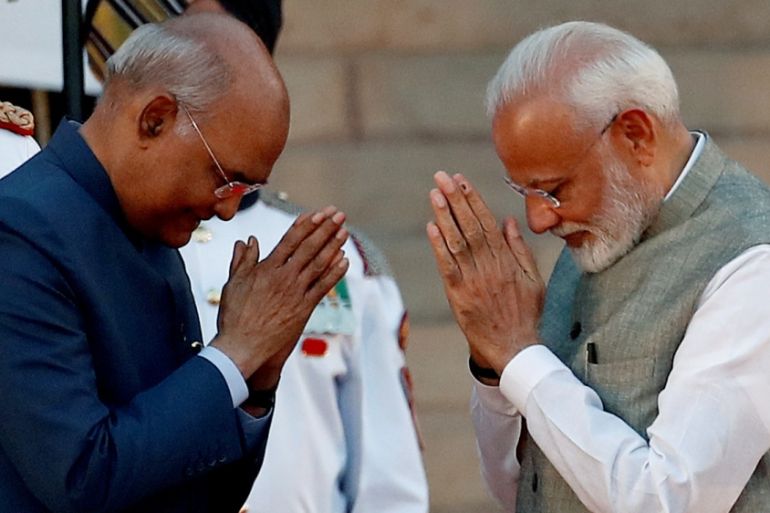India’s Modi sworn in for second term as prime minister
Thousands attend as Bharatiya Janata Party leader assumes office in New Delhi ceremony after landslide election win.

New Delhi, India – Narendra Modi was sworn in for a second term as India‘s prime minister, a week after his ruling Bharatiya Janata Party (BJP) easily cruised back to power.
In the presence of 8,000 guests on Thursday at India’s presidential palace, featuring the leaders of eight countries including Bangladesh, Myanmar and Thailand, Modi swore an oath to India’s constitution, imparted by the country’s president.
Keep reading
list of 4 itemsFull jury panel seated on third day of Trump’s New York hush-money trial
Jacob Zuma’s nine lives: How South Africa’s ex-president keeps coming back
A flash flood and a quiet sale highlight India’s Sikkim’s hydro problems
Modi’s successive single-party majorities, an electoral feat last achieved in the 1970s, has made him India’s most powerful leader in decades.
After a bitterly polarising campaign, in which the BJP often played on India’s religious divides, Modi tweeted his resolve to “build a strong and inclusive India”. Three days later, in a speech on Sunday, Modi said India’s minorities were “living in fear” and the BJP needed to win their trust.
However, after a Muslim man wearing a skull cap was attacked in Gurugram among a series of hate crimes, the divergence between rhetoric and reality, often seen in the past, started becoming clear. After Gautam Gambhir, a former cricketer newly elected to Parliament on a BJP ticket, criticised the Gurugram incident, he faced a severe backlash from his own party members.
For many in the BJP, Modi’s resounding re-election is a further consolidation of the project for an exclusivist Hindu nation. “This is the fulfilment of a dream,” said Praveen Shankar Kapoor, a spokesperson for the BJP. “That’s why we are so happy.”
Kapoor retraced the genealogy of his party, from its genesis in the 1950s as the openly Hindu supremacist Jana Sangh before its rebranding as the Bharatiya Janata Party in 1980. “After all, we are the same party,” he said.
‘Hindu nation is here’
A week after the election result, as Modi prepared to assume office again, the opposition Congress, which was decimated once more after being voted out of power in 2014, remained in a state of shock.
“The results were an astonishing disappointment,” said Sanjay Jha, a spokesperson for the Congress Party. Jha said the Congress Party-led alliance was confident of a comeback, but the resounding mandate for Modi had left it stunned.
“We focused on bread-and-butter issues … focusing on what we thought was ideal for the common man, cutting across castes and communities,” he added.
Jha admitted the Congress Party was blown away by the BJP’s twin-pronged strategy: reaffirming Modi’s strongman image following air raids on Pakistan in retaliation for a deadly attack on security forces in Kashmir, backed up by the party’s aggressive Hindu nationalism.
“He made political capital out of the air strikes,” Jha said. “The entire political narrative was hyper-nationalism, using India’s armed forces as a tool.”
Hartosh Singh Bal, the political editor of Caravan magazine in New Delhi, said India was likely to see “a strengthening of the Hindu nationalist agenda”.
“It’s going to be more domination of the universities, the further stifling of dissent,” said Bal.
The backlash against Gambhir, Bal suggested, was a signal that Modi’s second term was likely to be as divisive as his first. “The message to Gambhir was ‘don’t even try to express reasonable views.'”
“The Hindu nation is here,” he added. “As long as Muslims know they are second-class citizens and don’t demand a stake in public life, things will be fine for the Hindu nationalists.”
|
|
Controversial cabinet pick
The major talking point at Modi’s swearing-in was the induction into the cabinet of Amit Shah, the controversial and hardline president of the BJP.
Shah, who reportedly will become finance minister, has had a dark and chequered past. Before rising to national prominence along with Modi, he was alleged to have overseen extrajudicial killings while serving as home minister in the state of Gujarat. Shah was accused of being directly in touch with police officials who conducted the killings.
In 2010, the Supreme Court ordered Shah to stay out of Gujarat. In 2018, he was acquitted in the last of the criminal cases against him.
Fears that a second Modi term, once again without the restraints imposed by allies, would lead to a domineering style of governance came to the fore again before the swearing-in. The Janata Dal (United), an ally of the BJP in the eastern state of Bihar, rejected the sole cabinet berth offered to it and decided to stay out of the government. Sushma Swaraj, the external affairs minister in Modi’s first term but not seen as a loyalist, was dropped.
Jha, the Congress spokesperson, said Modi’s re-election had put India on “a difficult and dangerous path”.
Making a contrast between Mahatma Gandhi and his assassin, the Hindu nationalist Nathuram Godse, who was praised by many of Modi’s BJP members through the campaign, Jha said: “Ultimately, India will have to make a choice whether it wants to be the country of Gandhi or Godse.”